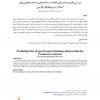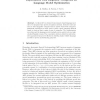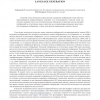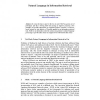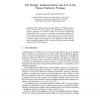CICLING
2003
Springer
13 years 9 months ago
2003
Springer
CICLING
2003
Springer
13 years 9 months ago
2003
Springer
We present an automatic method to disambiguate the senses of the near-synonyms in the entries of a dictionary of synonyms. We combine different indicators that take advantage of th...
CICLING
2003
Springer
13 years 9 months ago
2003
Springer
Abstract. This paper reports on the development of a finite state system for finding grammar errors without actually specifying the error. A corpus of Swedish text written by chi...
CICLING
2003
Springer
13 years 9 months ago
2003
Springer
In this work1 we obtain robust category-based language models to be integrated into speech recognition systems. Deductive rules are used to select linguistic categories and to matc...
CICLING
2003
Springer
13 years 9 months ago
2003
Springer
This paper presents a graph-theoretical approach to lexical disambiguation on word co-occurrences. Producing a dictionary similar to WordNet, this method is the counterpart to word...
CICLING
2003
Springer
13 years 9 months ago
2003
Springer
CICLING
2003
Springer
13 years 9 months ago
2003
Springer
It seems the time is ripe for the two to meet: NLP has grown out of prototypes and IR is having hard time trying to improve precision. Two examples of possible approaches are consi...
CICLING
2003
Springer
13 years 9 months ago
2003
Springer
CICLING
2003
Springer
13 years 9 months ago
2003
Springer
CICLING
2003
Springer
13 years 9 months ago
2003
Springer
A new sort of generative grammar (Sec2) will be demonstrated which is more radically “lexicalist” than any earlier one (Sec1). It is a modified Unification Categorial Gramma...
